Related Research Articles

East Germany, officially known as the German Democratic Republic, was a country in Central Europe from its formation on 7 October 1949 until its reunification with West Germany on 3 October 1990. Until 1989, it was generally viewed as a communist state and described itself as a socialist "workers' and peasants' state". The economy of the country was centrally planned and state-owned. Although the GDR had to pay substantial war reparations to the Soviets, its economy became the most successful in the Eastern Bloc.

The Korean War was an armed conflict on the Korean Peninsula fought between North Korea and South Korea and their allies. North Korea was supported by the People's Republic of China and the Soviet Union, while South Korea was supported by the United Nations Command (UNC) led by the United States. The conflict was the first major proxy war of the Cold War. Fighting ended in 1953 with an armistice but no peace treaty, leading to the ongoing Korean conflict.

Magna Carta Libertatum, commonly called Magna Carta or sometimes Magna Charta, is a royal charter of rights agreed to by King John of England at Runnymede, near Windsor, on 15 June 1215. First drafted by the Archbishop of Canterbury, Cardinal Stephen Langton, to make peace between the unpopular king and a group of rebel barons who demanded that the King confirm the Charter of Liberties, it promised the protection of church rights, protection for the barons from illegal imprisonment, access to swift and impartial justice, and limitations on feudal payments to the Crown, to be implemented through a council of 25 barons. Neither side stood by their commitments, and the charter was annulled by Pope Innocent III, leading to the First Barons' War.
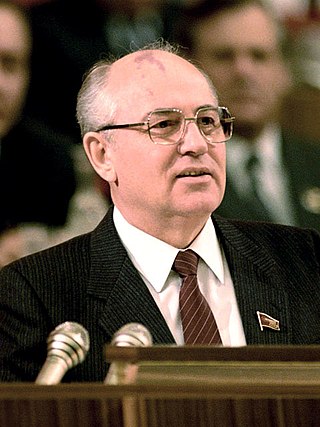
Mikhail Sergeyevich Gorbachev was a Soviet and Russian politician and statesman who served as the last leader of the Soviet Union from 1985 to the country's dissolution in 1991. He served as General Secretary of the Communist Party of the Soviet Union from 1985 and additionally as head of state beginning in 1988, as Chairman of the Presidium of the Supreme Soviet from 1988 to 1989, Chairman of the Supreme Soviet from 1989 to 1990 and the president of the Soviet Union from 1990 to 1991. Ideologically, Gorbachev initially adhered to Marxism–Leninism but moved towards social democracy by the early 1990s. He was the only Soviet leader born after the country's foundation.

Timothy James Curry is an English actor and singer. He rose to prominence as Dr. Frank-N-Furter in the musical film The Rocky Horror Picture Show (1975), reprising the role he had originated in the 1973 London, 1974 Los Angeles, and 1975 Broadway musical stage productions of The Rocky Horror Show.

Vincent Willem van Gogh was a Dutch Post-Impressionist painter who is among the most famous and influential figures in the history of Western art. In just over a decade, he created approximately 2,100 artworks, including around 860 oil paintings, most of them in the last two years of his life. His oeuvre includes landscapes, still lifes, portraits, and self-portraits, most of which are characterised by bold colours and dramatic brushwork that contributed to the rise of expressionism in modern art. Van Gogh's work was only beginning to gain critical attention before he died from a self-inflicted gunshot at age 37. During his lifetime, only one of Van Gogh's paintings, The Red Vineyard, was sold.
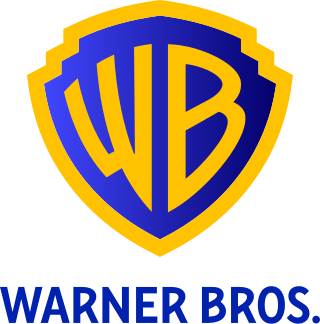
Warner Bros. Entertainment Inc. (WBEI), commonly known as Warner Bros. (WB), is an American filmed entertainment studio headquartered at the Warner Bros. Studios complex in Burbank, California, and is the flagship subsidiary of Warner Bros. Discovery (WBD). Founded on April 4, 1923 by four brothers, Harry, Albert, Sam and Jack Warner, the company established itself as a leader in the American film industry before diversifying into animation, television, and video game. It is one of the "Big Five" major American film studios and a member of the Motion Picture Association (MPA).

Macedonia, also called Macedon, was an ancient kingdom on the periphery of Archaic and Classical Greece, which later became the dominant state of Hellenistic Greece. The kingdom was founded and initially ruled by the royal Argead dynasty, which was followed by the Antipatrid and Antigonid dynasties. Home to the ancient Macedonians, the earliest kingdom was centered on the northeastern part of the Greek peninsula, and bordered by Epirus to the southwest, Illyria to the northwest, Paeonia to the north, Thrace to the east and Thessaly to the south.
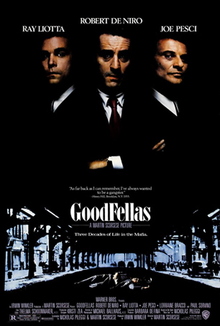
Goodfellas is a 1990 American biographical gangster film directed by Martin Scorsese, written by Nicholas Pileggi and Scorsese, and produced by Irwin Winkler. It is a film adaptation of Pileggi's 1985 nonfiction book Wiseguy. Starring Robert De Niro, Ray Liotta, Joe Pesci, Lorraine Bracco, and Paul Sorvino, the film narrates the rise and fall of mob associate Henry Hill and his friends and family from 1955 to 1980.
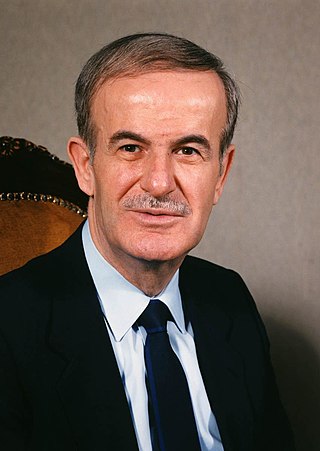
Hafez al-Assad was a Syrian politician, dictator and military officer who served as the 18th president of Syria from 1971 until his death in 2000. He had previously served as prime minister of Syria from 1970 to 1971 as well as regional secretary of the regional command of the Syrian regional branch of the Arab Socialist Ba'ath Party and secretary general of the National Command of the Ba'ath Party from 1970 to 2000. Hafez al-Assad was a key participant in the 1963 Syrian coup d'état, which brought the Syrian regional branch of the Arab Socialist Ba'ath Party to power in the country, a power that lasted until the fall of the regime in 2024, then led by his son Bashar.

Manuel Antonio Noriega Moreno was a Panamanian politician and military officer who was the de facto ruler of Panama from 1983 to 1989. He never actually served as president of Panama, instead ruling as an unelected military dictator through puppet presidents. Amassing a personal fortune through drug trafficking operations by the Panamanian military, Noriega had longstanding ties with American intelligence agencies before the U.S. invasion of Panama removed him from power.

The 1990 FIFA World Cup was the 14th FIFA World Cup, a quadrennial football tournament for men's senior national teams. It was held from 8 June to 8 July 1990 in Italy, the second country to host the event for a second time. Teams representing 116 national football associations entered and qualification began in April 1988. 22 teams qualified from this process, along with the host nation Italy and defending champions Argentina.

Magdalena Carmen Frida Kahlo y Calderón was a Mexican painter known for her many portraits, self-portraits, and works inspired by the nature and artifacts of Mexico. Inspired by the country's popular culture, she employed a naïve folk art style to explore questions of identity, postcolonialism, gender, class, and race in Mexican society. Her paintings often had strong autobiographical elements and mixed realism with fantasy. In addition to belonging to the post-revolutionary Mexicayotl movement, which sought to define a Mexican identity, Kahlo has been described as a surrealist or magical realist. She is also known for painting about her experience of chronic pain.

Randy Bruce Traywick, known professionally as Randy Travis, is an American country and gospel music singer and songwriter, as well as a film and television actor. Active since 1979, he has recorded over 20 studio albums and charted over 50 singles on the Billboard Hot Country Songs charts, including sixteen that reached the number-one position.

The Gulf War was an armed conflict between Iraq and a 42-country coalition led by the United States. The coalition's efforts against Iraq were carried out in two key phases: Operation Desert Shield, which marked the military buildup from August 1990 to January 1991; and Operation Desert Storm, which began with the aerial bombing campaign against Iraq on 17 January 1991 and came to a close with the American-led liberation of Kuwait on 28 February 1991.

The United States invaded Panama in mid-December 1989 during the presidency of George H. W. Bush. The stated purpose of the invasion was to depose the de facto ruler of Panama, General Manuel Noriega, who was wanted by U.S. authorities for racketeering and drug trafficking. The operation, codenamed Operation Just Cause, concluded in late January 1990 with the surrender of Noriega. The Panama Defense Forces (PDF) were dissolved, and President-elect Guillermo Endara was sworn into office.

Home Alone is a 1990 American Christmas comedy film directed by Chris Columbus, and written and produced by John Hughes. The first film in the Home Alone franchise, the film stars Macaulay Culkin as Kevin McCallister, an eight-year old boy who defends his Chicago home from a home invasion by a pair of robbers after his family accidentally leave him behind on their Christmas vacation to Paris. The cast also features Joe Pesci, Daniel Stern, John Heard, and Catherine O'Hara.

The 1990 United States census, conducted by the Census Bureau, determined the resident population of the United States to be 248,709,873, an increase of 9.8 percent over the 226,545,805 persons enumerated during the 1980 census.
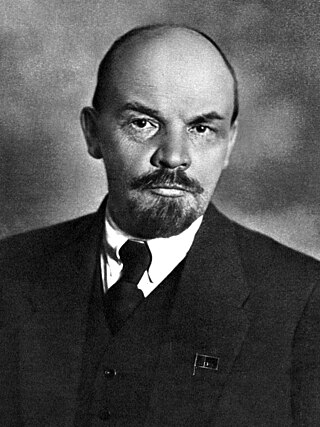
Vladimir Ilyich Ulyanov, better known as Vladimir Lenin, was a Russian revolutionary, politician and political theorist who was the founder and first head of government of Soviet Russia from 1917 until his death in 1924, and of the Soviet Union from 1922 until his death. The founder and leader of the Bolsheviks, Lenin led the October Revolution which established the world's first socialist state. His government won the Russian Civil War and consolidated power in a one-party state under the Communist Party. Ideologically a Marxist, his developments to the ideology are called Leninism.

The Russian Soviet Federative Socialist Republic, previously known as the Russian Soviet Republic and the Russian Socialist Federative Soviet Republic, and unofficially as Soviet Russia, was an independent federal socialist state from 1917 to 1922, and afterwards the largest and most populous constituent republic of the Soviet Union (USSR) from 1922 to 1991, until becoming a sovereign part of the Soviet Union with priority of Russian laws over Union-level legislation in 1990 and 1991, the last two years of the existence of the USSR. The Russian SFSR was composed of sixteen smaller constituent units of autonomous republics, five autonomous oblasts, ten autonomous okrugs, six krais and forty oblasts. Russians formed the largest ethnic group. The capital of the Russian SFSR and the USSR as a whole was Moscow and the other major urban centers included Leningrad, Stalingrad, Novosibirsk, Sverdlovsk, Gorky and Kuybyshev. It was the first socialist state in history.